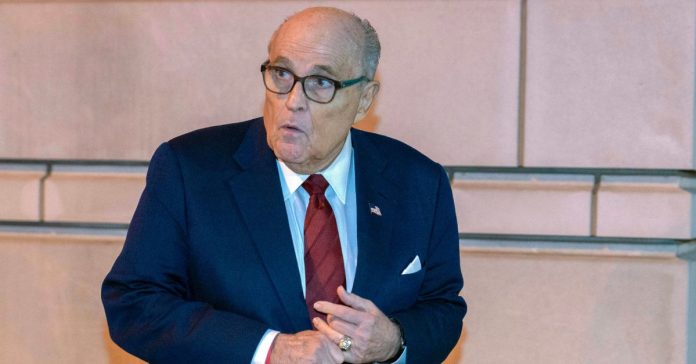
Former Mayor of New York, Rudy Giuliani, leaves the federal courthouse in Washington on Monday, Dec. 11, 2023. (AP Photo/Jose Luis Magana)
Rudy Giuliani cannot use the bankruptcy process to avoid paying the $148 million defamation verdict won by former Georgia election workers Ruby Freeman and Wandrea’ ArShaye “Shaye” Moss, a lawsuit filed in federal court on their behalf this week claims.
On Friday, New York City-based bankruptcy restructuring-focused attorney Rachel C. Strickland filed an adversary case to determine dischargeability of debt in the Southern District of New York Bankruptcy Court. The complaint is technically separate from, but intrinsically related to, Giuliani’s preexisting case on the docket there.
In the aftermath of Donald Trump’s 2020 election loss, Giuliani spread false allegations against Freeman and Moss — saying the pair engaged in fraud and had “cheated” Peach State voters. A defamation lawsuit ensued, and a default judgment was issued in their favor after Giuliani essentially ignored the lawsuit and engaged in what the court termed a “willful shirking of his discovery obligations.” A trial was held to determine compensatory and punitive damages. Jurors issued their verdict, and the court entered a final judgment order on Dec. 18.
Giuliani filed for bankruptcy three days later.
“Since Plaintiffs initiated the underlying lawsuit, Mr. Giuliani has treated the judicial process and its rules as something that does not apply to him,” the new complaint reads. “He is wrong. Causing willful and malicious injury to others has consequences. Mr. Giuliani cannot hide behind bankruptcy to escape those consequences and accountability for the devastating impact his actions caused.”
The heart of the filing is the claim that Giuliani’s defamation campaign against Freeman and Moss was a “willful and malicious injury.” And debts for such a tort cannot be discharged under the relevant section of U.S. bankruptcy law, the filing explains.
“Mr. Giuliani cannot use bankruptcy to escape accountability for his actions,” the filing reads. “All of the facts necessary to reach that conclusion have already been decided — and even conceded.”
The filing argues that when he lost by default in August 2023, and the final judgment was issued against him after the damages trial, “Giuliani conceded” the issues surrounding the limitations on dischargeable debt under the bankruptcy process. The Dec. 18, 2023 judgment signed by U.S. District Judge Beryl A. Howell categorizes Giuliani’s conduct as “intentional, malicious, wanton, and willful.”
Notably, the final judgment is based on and incorporates verbatim language from a joint stipulation signed by attorneys representing Moss, Freeman, and Giuliani in the underlying defamation case. A stipulation is a legal document in which opposing parties in a case or controversy agree to something.
The stipulation reads, in relevant part:
It is hereby DECLARED pursuant to 28 U.S.C. § 2201(a), as between Plaintiffs and Defendant: that Defendant’s conduct was intentional, malicious, wanton, and willful, such that Plaintiffs are entitled to punitive damages
“All that remains is for this Court to make the legal determination that Mr. Giuliani’s debt to Plaintiffs is not dischargeable,” Strickland argues in the Friday bankruptcy court filing. “Plaintiffs accordingly bring this adversary proceeding to obtain a determination that Mr. Giuliani’s debt to plaintiffs is not dischargeable in bankruptcy.”
Giuliani recently filed notice that he intends to appeal the defamation verdict — while also asking the district court for a new trial and to lessen his damages. The stipulation notes that in the event of an appeal or other success altering the verdict, the relief granted to Freeman and Moss would “be conformed” to any later court decision.
Law&Crime reached out to Giuliani’s bankruptcy counsel for comment on this story, but no response was immediately forthcoming.
Have a tip we should know? [email protected]

